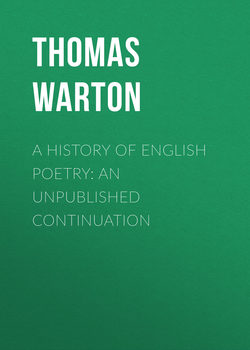Читать книгу A History of English Poetry: an Unpublished Continuation - Thomas Warton - Страница 2
A HISTORY OF ENGLISH POETRY: AN UNPUBLISHED CONTINUATION
Оглавление(In enumerating so many of these petty Epigrammatists, I may have been perhaps too prolix,—but I did it to shew the taste & turn of writing at this time; & now proceed to observe, that, in the year, 1614,)8 the vogue which satire had acquired from Hall and Marston, probably encouraged Barten Holiday of Christ-Church in Oxford, to translate Persius, when he was scarcely twenty years of age. The first edition is dated 1616. This version had four editions from its publication to the year 1673 inclusive, notwithstanding the versification is uncommonly scabrous. The success of his Persius induced Holiday to translate Juvenal, a clearer & more translatable satirist. But both versions, as Dryden has justly observed,9 were written for scholars, and not for the world: and by treading on the heels of his originals, he seems to have hurt them by too near an approach. He seized the meaning but not the spirit of his authors. Holiday, however, who was afterwards graduated in divinity and promoted to an archdeaconry, wrote a comedy called the Marriage of the Arts, acted before the court at Woodstock-palace, which was even too grave and scholastic for king James the first.
I close my prolix review of these pieces by remarking, that as our old plays have been assembled and exhibited to the public in one uniform view,10 so a collection of our old satires and epigrams would be a curious and useful publication. Even the dull and inelegant productions, of a remote period which have real Life for their theme, become valuable and important by preserving authentic pictures of antient popular manners: by delineating the gradations of vice and folly, they furnish new speculation to the moral historian, and at least contribute to the illustration of writers of greater consequence.
Sect. XLIX
The Sonnet, together with the Ottava Rima, seems to have been the invention of the Provincial bards, but to have been reduced to its present rhythmical prosody by some of the earliest Italian poets. It is a short monody, or Ode of one stanza containing fourteen lines, with uncommonly frequent returns of rhymes more or less combined. But the disposition of the rhymes has been sometimes varied according to the caprice or the convenience of the writer. There is a sonnet of the regular construction in the Provincial dialect, written by Guglielmo de gli Amalricchi, on Robert king of Naples who died in 1321.11 But the Italian language affords earlier examples. (The multitude of identical cadences renders it a more easy and proper metre to use in Italian than in English verse.)
No species of verse appears to have been more eagerly and universally cultivated by the Italian poets, from the fourteenth century to the present times. Even the gravest of their epic and tragic writers have occasionally sported In these lighter bays. (A long list of them is given in the beginning of the fourth Volume of Quadrios History of Italian Poetry.) But perhaps the most elegant Italian sonnets are yet to be found in Dante. Petrarch's sonnets are too learned (metaphysical) and refined. Of Dante's compositions in this style I cannot give a better idea, than in (the ingenious) Mr. Hayley's happy translation of Dante's beautiful sonnet to his friend Guido Calvacanti [sic], written in his youth, and probably before the year 1300.
Henry! I wish that you, and Charles, and I,
By some sweet spell within a bark were plac'd,
A gallant bark with magic virtue grac'd,
Swift at our will with every wind to fly:
So that no changes of the shifting sky
No stormy terrors of the watery waste,
Might bar our course, but heighten still our taste
Of sprightly joy, and of our social tie:
Then, that my Lucy, Lucy fair and free,
With those soft nymphs on whom your souls are bent,
The kind magician might to us convey,
To talk of love throughout the livelong day:
And that each fair might be as well content
As I in truth believe our hearts would be.12
We have before seen, that the Sonnet was imported from Italy into English poetry, by lord Surrey and Wyat, about the middle of the sixteenth century. But it does not seem to have flourished in its legitimate form, till towards the close of the reign of queen Elisabeth. What I call the legitimate form, in which it now appeared, was not always free from licentious innovations in the rythmical arrangement.
To omit Googe, Tuberville [sic], Gascoigne, and some other petty writers who have interspersed their miscellanies with a few sonnets, and who will be considered under another class, our first professed author in this mode of composition, after Surrey and Wyat, is Samuel Daniel. His Sonnets
8
[Thomas Warton's original version began "The temporary vogue which …" The final version, here parenthesized in the text, represents, it seems fairly certain, Joseph Warton's expansion. Although this deprecatory comment seems rather abrupt coming after five sections devoted to the Elizabethan satirists, Joseph Warton is not disparaging where his brother praised. Thomas Warton had already (IV, 69) belittled the "innumerable crop of satirists, and of a set of writers differing but little more than in name, and now properly belonging to the same species, Epigrammatists."]
9
[Warton here combined several remarks in Dryden's essay "The Original and Progress of Satire." See John Dryden, Essays, ed. W. P. Ker (Oxford, 1900), II, 111-112. There were six, not four editions of Holiday's Persius.]
10
[Warton refers presumably to Isaac Reed's Collection of Old Plays (London, 1780).]
11
[Jehan de] Nostredam [e]. [Les] Vies des […] Poet[es] Provens[aux]. [Lyon, 1575] n. 59. pag. 199.
12
[William Hayley. An] Ess[ay] on Epic Poetry. [London, 1782] Notes, Ess. iii. v. 81. p. 171.
